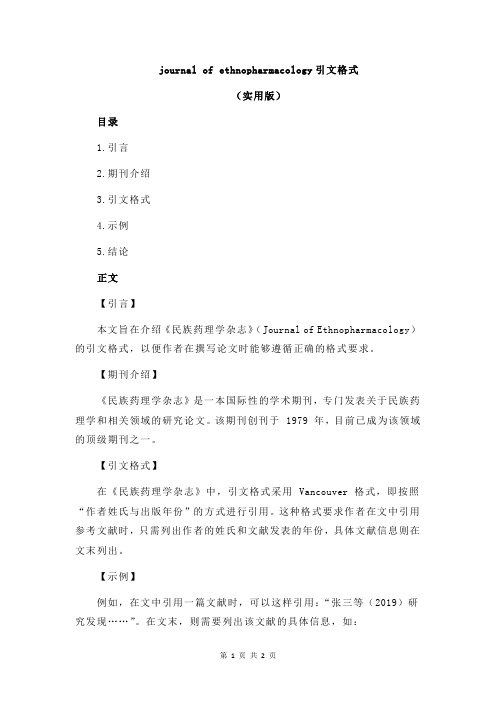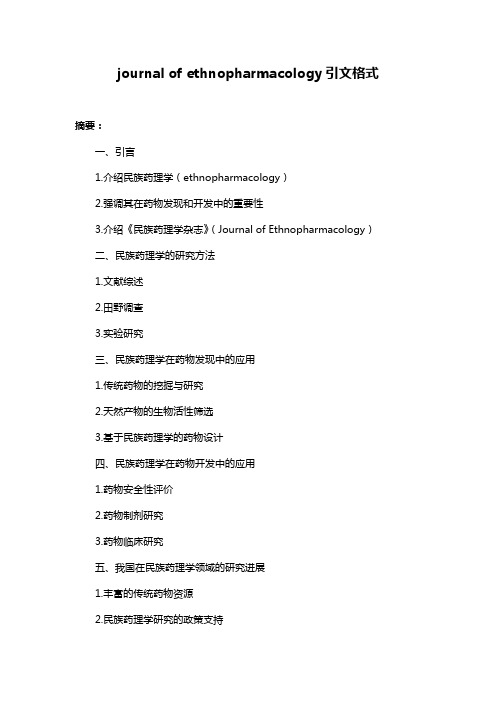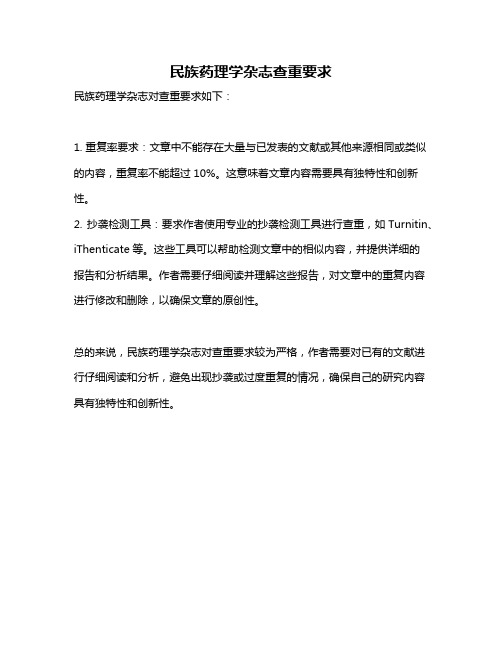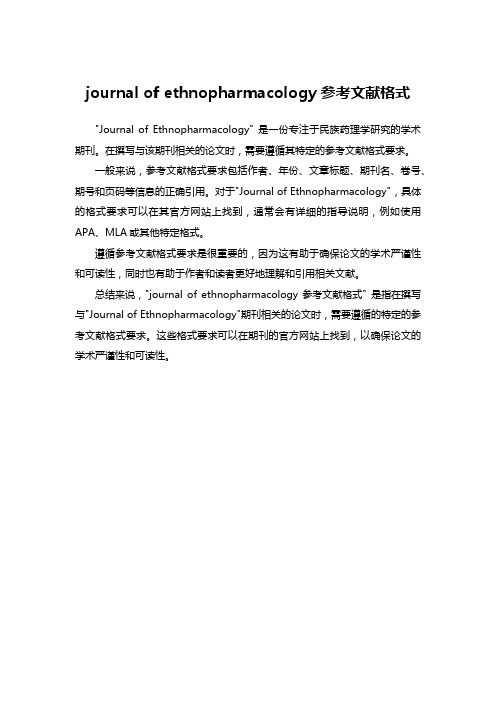民族药理学作者须知
中国药理学通报投稿模板

中国药理学通报投稿模板全文共四篇示例,供读者参考第一篇示例:一、简介《中国药理学通报》是中国药理学会主办的学术刊物,旨在促进药理学领域的学术交流和研究成果的传播。
本刊以发表原创、高质量的药理学研究成果为宗旨,涵盖药理学的基础研究、临床药理学、慢性病药理学等多个领域。
欢迎广大药理学研究人员积极投稿。
二、投稿要求1. 投稿内容应为未在其他期刊或会议上公开发表的原创性研究成果。
2. 投稿人需详细描述研究目的、方法、结果和结论,确保实验数据可靠,并符合学术规范。
3. 投稿文章应具备一定的创新性和学术价值,对药理学领域具有推动作用。
4. 文章格式应符合《中国药理学通报》的排版要求,语言表达准确、清晰。
5. 投稿人需确保所提交的文章不涉及任何侵犯他人合法权益的内容,如有侵权行为,一切责任由作者承担。
三、投稿流程1. 投稿人可通过《中国药理学通报》官方网站或邮件方式进行投稿。
2. 投稿人需填写《中国药理学通报》的投稿申请表,并将文章原件、排版格式等相关材料一并提交。
3. 投稿后,编辑部将会在较短时间内进行初审,符合条件的文章将进入专家评审环节。
4. 文章通过专家评审后,编辑部将与作者取得联系,通知相关事宜。
四、注意事项1. 投稿人在投稿前应认真阅读《中国药理学通报》的投稿须知和期刊要求,确保文章符合相关规定。
2. 如有涉及其他学者合作的情况,需在投稿时注明各位作者的真实姓名和单位,并保证各位作者均同意投稿。
3. 投稿人提交的文章必须是自己的研究成果,不得抄袭或剽窃他人的内容。
4. 投稿人需确保文章中使用的图片、表格等资料不侵犯他人的著作权,并在必要时提供相关资料的授权证明。
五、投稿联系方式《中国药理学通报》编辑部联系方式:地址:XXX省XXX市XXX街XXX号电话:XXXX-XXXXXXX邮箱:***************《中国药理学通报》是展示和传播药理学研究成果的重要平台,我们期待着您的积极投稿和精彩文章。
民族药理学杂志参考文献endnote格式

民族药理学杂志参考文献endnote格式【民族药理学杂志参考文献endnote格式】一、前言在学术研究中,引用参考文献是非常重要的一环。
而对于学术期刊来说,如何规范地使用endnote格式来引用参考文献,尤为重要。
本文将深入探讨民族药理学杂志参考文献endnote格式的相关内容,帮助读者更好地理解和运用该格式。
二、民族药理学杂志参考文献endnote格式的基本要求民族药理学杂志对参考文献的格式有严格的要求,而endnote格式则是其常用的引用方式之一。
在使用endnote格式时,需要注意以下几个基本要求:1. 文章标题、作者、期刊名称、发表年份等信息的排列顺序和格式要求。
2. 文献作者的署名方式,包括英文姓氏在前还是在后,多位作者时的表示方法等。
3. 文献的整体格式,包括字体、字号、行间距等。
4. 表格和图片的编号和标注格式。
5. 参考文献的排序方式,可以是按作者姓氏字母顺序、引用先后顺序等。
三、深度解析民族药理学杂志参考文献endnote格式为了更好地了解民族药理学杂志参考文献endnote格式的具体规范,我们需要深入研究该格式在实际运用中的细节问题。
对于不同类型的文献,如期刊论文、会议论文、专著、专利等,其在endnote格式中的引用方式是否存在差异?又或者,对于同一作者的多篇文章,其在endnote格式中的引用方式又有何特殊之处?这些都是我们需要深入思考和探讨的问题。
值得注意的是,在实际写作和编辑过程中,由于参考文献的不断更新和完善,可能会出现一些特殊情况,比如某篇文献信息不全、作者尊称拼写错误等。
对于这些特殊情况,我们需要潜心研究民族药理学杂志关于endnote格式的特殊规定,以确保引用参考文献的准确性和规范性。
四、总结回顾通过本文的探讨,我们对民族药理学杂志参考文献endnote格式有了更深入的了解。
其实,不仅仅是民族药理学杂志,在其他学术期刊中,endnote格式都具有一定的规范要求,而这些规范也是为了确保学术研究的严谨性和可靠性。
民族药理学cover letter模板

尊敬的编辑:我是XXX,XXX大学的一名民族药理学研究员。
我很荣幸能有机会将我们团队最新的研究成果提交给贵刊。
我们的研究课题主要关注民族药物在疾病治疗和健康保健中的作用机制、药理学特性以及临床应用等方面。
经过多年的不懈努力,我们团队已取得了一些令人鼓舞的研究成果。
我们相信这些成果有望为该领域的研究和临床实践做出一定的贡献。
以下是我们将提交的研究论文的主要内容:1. 研究背景和意义:我们将介绍该研究领域的国内外研究现状和存在的问题,以及我们研究的意义和价值所在。
2. 研究方法:我们将详细阐述我们的研究设计、实验方案、数据采集和分析方法等。
3. 研究结果:我们将展示并分析我们研究的主要结果和发现,包括实验数据、统计分析和结论等。
4. 论文创新点:我们将突出强调我们研究的创新之处,以及对该领域的学术和实践价值。
我们团队深知贵刊对学术研究的严谨要求,我们也将严格按照贵刊的投稿要求和学术规范准备论文,并愿意接受审稿人和编辑的批评和建议,积极改进我们的研究成果。
在此,我们诚挚地邀请贵刊评阅我们的研究论文,并期待能够获得贵刊的认可和支持。
谨代表我们的研究团队,向贵刊编辑部致以诚挚的谢意!此致敬礼!XXX 敬上尊敬的编辑:我们团队深知贵刊对学术研究的严谨要求,因此在进行研究时,我们严格按照国际通行的学术规范进行设计、实施和分析。
我们的研究内容涉及民族药物的药理学特性、作用机制以及临床应用等方面。
我们通过临床实验、动物模型、细胞实验等多种手段,对不同类型的民族药物进行系统研究和验证,以期揭示其药效物质基础、作用机制和毒副作用等信息,促进民族药物在现代医学中的合理利用。
我们的研究团队由一批有丰富研究经验的科研人员组成,包括教授、博士生导师、博士、硕士研究生以及实验技术人员。
在长期的研究实践中,我们积累了丰富的研究经验,并且建立了完善的研究体系和实验评台,能够确保研究的严谨性和科学性。
在我们近期的研究中,我们团队重点关注了一种来自民间传统的草药,通过我们的研究,我们验证并发现了这种草药对某种慢性疾病有明确的治疗效果。
名族药理学

名族药理学“名族药理学”,顾名思义,是研究不同民族或地区所使用的传统药物及其药理作用的一门学科。
它不仅与传统民族医学相关,也与现代医学有着千丝万缕的联系。
首先,名族药理学与传统民族医学密切相关。
随着现代医学的快速发展,越来越多的人将目光投向了传统医学,并逐渐接受并认可其在许多疾病治疗方面的独特贡献。
中医、藏医、蒙医等各民族的传统医学,自古以来都是人们治病的重要手段,而其中使用的许多中药、藏药、蒙药等均有其特殊的药理作用。
因此,研究不同民族的药物及其药理作用,不仅有助于传承和发展传统医学,也有助于对传统医学进行更加科学和理性的评估。
其次,名族药理学也与现代医学有着千丝万缕的联系。
不同民族所使用的传统药物,其药理作用多是通过现代科技手段所能分析出来的。
例如,南北草药中的许多有效成分,在经过现代化的提取和分离后,被运用于现代医学,广泛应用于各种疾病的治疗中。
此外,现代医学研究的一些重要药物,也可以通过名族药理学的研究,来找寻其在不同民族传统药物中的源头,进一步发展和完善现代药物。
最后,名族药理学的研究具有重要的意义。
名族药理学不仅可以帮助我们更好地理解和评估传统民族医学,也可以指导现代医学对一些重大疾病的治疗。
此外,名族药理学的研究也具有保护民族文化的意义。
许多民族的药物,不仅是治疗疾病的重要手段,也是传统文化的重要组成部分。
保护和传承这些药物,有助于保护我们丰富多彩的民族文化。
总之,名族药理学在传承和发展传统医学、促进现代医学进步、保护民族文化等方面,具有不可替代的重要意义。
我们应该积极关注和支持这门学科的发展,让传统医学和现代医学相互促进,为人类的健康事业做出更大的贡献。
《中药药理与临床》投稿须知

《中药药理与临床》投稿须知1 本刊为中国药理学会主办的中药药理学学术刊物,由中国药理学会中药药理专业委员会具体负责。
本刊办刊宗旨:引导中药药理学学术发展,促进中药药理学学术交流,培养中药药理学专业人才。
2 作为学会的专业刊物,作者、读者、编者之间的良好关系与互动是办好刊物的关键。
本刊接受有助于我国中药药理学学科建设和发展的中药药理研究相关论文,特别欢迎中药药理基础与临床研究学术论文,本刊也关注中药开发研究及研究生学位论文的刊出。
有关中药药理学学科建设和发展的发现、发明、改进、思路与方法是本刊刊出论文的重点。
3 投稿务请遵照本刊格式和相关要求。
研究论文一般请按标题、作者、单位;摘要、关键词;前言、材料与方法、结果、讨论;参考文献、英文摘要、英文关键词等顺序排列。
①标题:标题请准确、贴切,由标题可知内容核心。
标题应能反映全文精华之所在,尽量不使用空泛词语,如“×××的药理作用研究”、“×××的药效学研究”……,一般不加附标题。
②作者:作者不宜太多,以对论文有实质性贡献并能回答问题者为准,其它参予实验人员必要时可于文末致谢。
一般以第一作者为责任作者(通讯作者),如责任作者非排列第一,则务请标明。
作者顺序于投稿时即应排定,投稿后若有变化,必须附纸质函件并盖单位公章及全部作者亲笔签名。
责任作者(通讯作者)将对论文的全部内容负责,并于文稿中写明联系方式(最好是可及时联系上的手机、固定电话)。
除非作者乐意于论文刊出时于文内标明联系方式并明确告之编辑部,论文正式刊出时按惯例本刊一律将通讯方式删去。
请通讯作者或第一作者与编辑部联系时注明手机号码。
有鉴于研究生论文增多,本刊建议研究生导师对自己研究生的文稿在寄出前务必认真进行审读、把关,如无特殊申明,本刊按惯例视研究生导师为论文的责任作者。
③单位:作者下行用圆括号标明单位名称、城市及邮编,一般不要超过两个单位,第一单位名应是完成该论文的主要实验场所,而不一定是作者任职或学习单位,如有必要,任职单位可用小字标于该文首页末行以便于读者联系。
常用黎药药理学

阅读感受
《常用黎药药理学》是一本非常有价值的专业书籍。它不仅让我对黎族传统 药物的药理学有了更深入的了解,也让我对药理学的研究方法和应用有了更全面 的认识。我相信,这本书对于从事药物学和药理学研究的专业人士以及对此感兴 趣的读者来说,都将是一本宝贵的参考书籍。
目录分析
目录分析
《常用黎药药理学》是一本专注于黎族传统药物药理学的专著,旨在深入剖 析和挖掘黎族医药的宝贵遗产,为现代医药学提供新的视角和思路。通过对其目 录的细致分析,我们可以对该书的内容结构和研究深度有一个大致的了解。
精彩摘录
精彩摘录
《常用黎药药理学》是一本深入探讨黎族传统药物药理作用的学术著作,它 汇集了众多黎族医学的智慧与现代药理学的知识,为读者揭示了黎药的独特魅力 和治疗效果。以下是该书中的一些精彩摘录,展现了黎药的神奇之处。
精彩摘录
“黎族医药,源远流长,其独特的理论体系和治疗手段,是我国民族医药宝 库中的璀璨明珠。黎药多源于自然,以植物药为主,其药效独特,且往往伴随着 一些神奇的传说和故事。”这段引言不仅概括了黎族医药的历史和地位,还激发 了读者对黎药的好奇和兴趣。
阅读感受
书中还涉及了一些现代药理学研究的热点和前沿领域,如药物基因组学、药 物代谢组学等。这些内容不仅拓宽了我的视野,也让我对药理学的研究方向和发 展趋势有了更清晰的了解。
阅读感受
在阅读这本书的过程中,我也遇到了一些挑战。由于黎族传统药物的种类繁 多,其药理学研究也相对复杂,因此在学习过程中需要花费较多的时间和精力。 正是这种挑战让我更加深入地理解了药理学的复杂性和重要性。
精彩摘录
《常用黎药药理学》还深入探讨了黎药的开发与利用前景。书中指出,“随 着现代医学的发展,黎药的药理作用和有效成分逐渐被揭示和证实。许多黎药已 经成为新药研发的重要来源,其独特的药理作用为治疗一些现代医学难题提供了 新的思路和方法。”这一部分的内容不仅展现了黎药的巨大潜力,也激发了人们 对黎药未来发展的期待。
中国药理学通报审稿流程详解

中国药理学通报审稿流程详解摘要:1.引言:介绍《中国药理学通报》的概述2.审稿流程:详解《中国药理学通报》的审稿流程3.投稿须知:提供投稿《中国药理学通报》的注意事项4.结论:总结《中国药理学通报》的审稿流程及投稿须知正文:《中国药理学通报》是我国药理学领域的一本权威性期刊,由中国科学技术协会主管,中国药理学会主办。
期刊主要报道药物的研究与开发、药理学实验方法、药物安全性评价、药物代谢等方面的学术论文。
为了让广大作者了解该期刊的审稿流程,本文将对其进行详细解读。
一、审稿流程1.作者投稿:作者通过《中国药理学通报》官方网站投稿系统进行投稿,需注意填写完整的个人信息和稿件相关信息。
2.编辑初审:编辑部对收到的稿件进行初步审查,主要检查稿件的格式、结构、语言等方面是否符合期刊要求。
3.专家审稿:通过初审的稿件将送至相关领域的专家进行审稿。
专家对稿件的学术价值、创新性、研究方法等方面进行评估,并提出修改建议。
4.编辑终审:根据专家的审稿意见,编辑部对稿件进行终审。
终审通过的稿件将被接受发表。
5.作者修改:作者根据专家和编辑部的意见对稿件进行修改,并提交最终稿。
6.接收发表:稿件通过终审后,将被安排在近期的期刊中发表。
二、投稿须知1.投稿类型:本刊接受原创研究论文、综述文章、简短的研究报告等类型的稿件。
2.文献引用:稿件中涉及的文献应按照中国药理学会的格式要求进行引用。
3.作者信息:作者需提供完整的个人信息,包括姓名、单位、职称、联系方式等。
4.投稿协议:作者需签署投稿协议,声明稿件为原创作品,并保证不存在版权纠纷。
5.保密审查:稿件涉及的研究内容需符合国家有关保密的规定。
6.稿件处理费:投稿时需缴纳一定的稿件处理费。
总之,《中国药理学通报》的审稿流程严谨、规范,为保证学术质量,对投稿的论文进行严格的把关。
作者在投稿时需注意各项要求,确保稿件符合期刊的标准。
中国药理学通报投稿及阅读须知

14文内标题层次不宜过多,一律用“1”、“1.1”、“1.1.1”、“1.1.1.1”标示,均顶格排。外文字母和数字均需打字,如系上、下标,黑、斜体请用铅笔标·Ⅱ·中国药理学通报 Chinese Pharmacological Bulletin 1997 Feb;13(1)示。如用黑体字,其下方用波浪线“ ”表示,如用斜体字(中文楷体字),其下方用横线“——”表示。黑体字主要用于:①各级标题序号;②英文标题及摘要、关键词、ABSTRACT、KEY WORDS等词;③参考文献中“卷”;④图表标题;⑤“1”、“1.1”两级标题,“1”级标题后不接排,“1.1”级标题后如无“1.1.1”三级标题则接排。“1.1.1”级标题用正楷字,“1.1.1.1”级标题用宋体字,各级标题后均不加标点,如接排只需空1格。楷体字主要用于:①“1.1.1”级标题(序号用黑正);②参考文献表中的中文期刊名及“参考文献”四字;③致谢;④小短文的标题及署名(括在括号中);⑤作者中文单位(放在注脚处的单位用6宋体)。
大学-中药学-民族医药基础知识

民族医药基础知识第一节藏医药基础知识一、藏药的概念在藏族医学理论指导下配制和应用的药物称为藏药。
它主要来源于天然药物及其加工品。
藏药与国内其他少数民族药一样,是祖国传统医药的重要组成部分。
第四章民族医药基础知识二、藏医基础知识(一)五元学说五元即土、水、火、风、空五种物质元素土元“沉、稳、坚、黏”,功能持载和固定,是万物产生和存在的基础;水元“重、寒、湿、润”,功能湿润和聚拢,能使万物滋润和聚拢成形;火元“热、轻、锐、腻”,功能温和和熟腐,能使万物产生温热和促使成熟;风元“轻、动、糙、燥”,能使万物运动和保持干燥;空元“空、虚”,能为万物运动和生长提供空间。
(二)三因学说(三)阴阳学说藏医学中“阴阳”概念多以寒、热;日、月;水、火;强、弱;峻、缓;动、静等意思相对的名词来表述,尤其是以寒、热来表述的更多,几乎成了阴阳的代名词。
(四)治疗方法(1)平息法:系指用饮食、起居和服用药物把疾病平息于体内。
(2)补益法:系指对隆病患者、体质虚弱者、失血过多者、长期失眠者、悲伤过度者等进行滋补。
(3)消散法:系指服用药物及禁食或使用清淡饮食使身体消瘦。
(4)排出法:有药物引吐、泻下、汗法及外治法。
(5)引吐法:服用具有催吐功能的方药,吐出宿食、毒物和病邪,达到治疗存在于上体部位的疾病,特别是培根病。
(6)汗法(7)油疗法:系指食用动、植物油脂或外用涂擦、点滴身体特定部位。
(8)泻下法:系指内服具有泻下功能的方药或灌肠,将腹内疾病尤其是赤巴病排出体外。
(9)滴鼻法:将药汁滴入鼻腔,药力通过鼻黏膜吸收,渗入耳、目、头、脑等部位达到醒脑开窍和治疗疾病的目的。
(10)利尿法:系服用具有收敛、扩张血管及利尿功能的方剂,将沉于深处的陈旧病邪通过各毛细血管运送到尿液,由尿道排出体外,此法又称脉泻法。
(11)外治法:系利用药物、物理作用及外科手术等手段,从体外实施治疗,通过疏通经络、活血化瘀、排除脓血、剔除腐肌等达到内病外治的目的。
journal of ethnopharmacology引文格式

journal of ethnopharmacology引文格式
(实用版)
目录
1.引言
2.期刊介绍
3.引文格式
4.示例
5.结论
正文
【引言】
本文旨在介绍《民族药理学杂志》(Journal of Ethnopharmacology)的引文格式,以便作者在撰写论文时能够遵循正确的格式要求。
【期刊介绍】
《民族药理学杂志》是一本国际性的学术期刊,专门发表关于民族药理学和相关领域的研究论文。
该期刊创刊于 1979 年,目前已成为该领域的顶级期刊之一。
【引文格式】
在《民族药理学杂志》中,引文格式采用 Vancouver 格式,即按照“作者姓氏与出版年份”的方式进行引用。
这种格式要求作者在文中引用参考文献时,只需列出作者的姓氏和文献发表的年份,具体文献信息则在文末列出。
【示例】
例如,在文中引用一篇文献时,可以这样引用:“张三等(2019)研究发现……”。
在文末,则需要列出该文献的具体信息,如:
张三,李四,王五。
民族药理学研究进展 [J].民族药理学杂志,2019, 20(3): 22-33.
【结论】
遵循《民族药理学杂志》的引文格式,有助于确保论文的规范性和专业性。
中国民族药理学概述

中国民族药理学概述
耿晓照
【期刊名称】《中国民族医药杂志》
【年(卷),期】2000(0)S1
【摘要】本文概要的说明了中国民族药理学的意义和主要任务、研究的内容和方法。
并作出了展望。
【总页数】2页(P47-48)
【关键词】民族医药;药理学;民族药理学
【作者】耿晓照
【作者单位】贵州省中医研究所
【正文语种】中文
【中图分类】R29
【相关文献】
1.盛世金钟国乐飘红——第六届中国音乐金钟奖民乐比赛(二胡、古筝)暨2007中国江苏二胡之乡民族音乐节概述 [J], ;
2.中国人类学民族学研究会2016年年会“新型城镇化建设与民族教育”专题会议概述 [J], 陈·巴特尔
3.国外研究中国各族神话概述--《中国各民族神话研究外文论著目录》序 [J], 李福清
4.民族主义:当今国际风云中的热点——“当前国际关系中民族主义的上升及其对
中国的影响”研讨会概述 [J], 余建华
5.中国特色社会主义民族理论体系新概述 [J], 沈林
因版权原因,仅展示原文概要,查看原文内容请购买。
民族药理学同行评审状态

民族药理学同行评审状态全文共四篇示例,供读者参考第一篇示例:民族药理学是研究民族药物的药理学特性以及其在预防和治疗疾病中的作用的学科,是中医药领域中的重要分支之一。
近年来,随着中医药在世界范围内的影响力不断增强,对民族药理学的研究也越来越受到关注。
同行评审是学术界评估研究工作质量和影响力的重要方式,而民族药理学领域的同行评审状态也备受关注。
一方面,民族药理学研究的同行评审质量不容忽视。
同行评审是学术研究的质量保证,能够确保研究结论的科学性和可靠性。
由于民族药理学研究领域相对特殊,涉及的领域较广,研究方法和技术也比较独特,因此同行评审者需要具备较高的专业知识和经验才能够进行有效的评审。
在民族药理学领域,同行评审者的数量和质量仍存在一定的不足。
为了解决民族药理学同行评审存在的问题,可以从以下几个方面进行改进:1. 增加同行评审者的数量和质量。
可以通过培训和引进高水平的专家学者,提高民族药理学研究领域的同行评审者数量和质量,确保同行评审工作的科学性和准确性。
2. 建立统一的评审标准和流程。
可以借鉴其他领域的评审机制,建立民族药理学领域的专门评审标准和流程,规范同行评审工作,提高评审效率和质量。
3. 加强同行评审者之间的交流和合作。
可以通过举办学术会议、研讨会等活动,促进同行评审者之间的交流和合作,提高评审工作的效率和质量。
随着中医药在全球范围内的影响力不断增强,民族药理学的研究也日益受到关注。
加强民族药理学同行评审工作,提高评审质量和效率,不仅有助于促进民族药理学研究的发展,也能够提升中医药在全球范围内的影响力和竞争力。
希望相关部门和学术界能够共同努力,建立健全的民族药理学同行评审体系,推动民族药理学研究的发展和进步。
【以上内容仅供参考】。
第二篇示例:民族药理学是研究不同民族传统药物及其药效的学科领域,已经成为传统药物研究的重要组成部分。
在过去的几十年里,民族药理学取得了许多重要的研究成果,很多民族药物也被证明具有显著的药理活性和疗效。
民族药物学概论复习题(1)

一.名词解释:1 民族药物学:研究在各民族或部落的传统医药理论指导下所使用药物的科学。
民族药物:具有各自民族医药理论指导使用的药物及民间药。
2 传统医学:是指传统中医学、印度医学及阿拉伯医学等传统医学体系及多种形式的民间疗法的统称。
3 藏茵陈:是藏药中最具特色的治疗热症肝胆病及血病的一大类药,包括二十几种植物,其中有龙胆科獐牙菜属川西獐牙菜、抱茎獐牙菜、印度獐牙菜等种和花锚属、扁蕾属、肋柱花属数种及虎耳草科虎耳草属数种。
4 药用资源:包括植物资源、动物资源和矿物资源。
广义的药物资源,还包括栽培和饲养的药用动植物,利用生物技术繁殖的个体和活性有效物质。
因此,又可以分为天然药用资源和人工、栽培或饲养的药用动植物资源。
5 自然疗法:以人体健康为核心,强调维持身体健康、预防疾病和机体的自愈能力,在医疗过程中尽量避免采用任何削弱机体自愈能力的医疗手段,即采用对人体无任何毒副作用但同时又能防病治病的非药物治疗。
6 东医学:公元五世纪时,中医药传入朝鲜半岛,并在实践过程中与当地医药学结合,成为韩国和朝鲜的传统医药学,并成为东医学。
7 地方标准:各省、直辖市、自治区卫生厅(局)审批的药物标准。
8 中草药:随着人们对草药的不断研究认识,一些疗效较好的草药逐渐被中医多应用或作为药材收购,于是又将中药和草药称为中草药。
二.主要知识点:1 朝药学有以下几个特点:一是三统法,即采用“三统分类法” ,把方剂的补、和、攻作用分类成上统、中统、下统,使医者便于选用虚实补泄的各种方剂。
这是朝医最多用的方法。
二是单方为特色,据统计《东医宝鉴》收载单方1862 方,《四象金匮秘方》收载单方1297方,三是四象用药法,即辩象施药,对不同人象适应不同药物,固定实用。
四是滋补疗法,常用的有黄芪炖鸡、人参炖鸡、蜈蚣炖鸡等。
2 《东医寿世保元》是境外朝鲜四象医学家李济马著。
从人的体格和气质把人的体质分为太阳、少阳、太阴、少阴四象人,较完整地提示了相应的诊疗方法,是一部医学史上划时代的新学说,对我国的朝鲜民族医学的发展具有重大意义。
中药民族药理学投稿要求

中药民族药理学投稿要求中药民族药理学:研究与实践的双重使命中药民族药理学是专门研究中药和民族药物在人体内作用机制的一门科学。
这门学科起源于中国古代的医药学传统,但在现代科学技术的推动下,已经发展成为一种具有深厚理论基础和实践应用价值的综合性学科。
本文将深入探讨中药民族药理学的概念、原理、应用领域以及投稿要求,以期为广大学者提供一些参考。
一、中药民族药理学的概念与起源中药民族药理学是研究中药和民族药物在人体内作用机制的一门科学,它涵盖了药物的药效学、药代动力学、不良反应以及临床合理用药等多个方面。
中药民族药理学不仅是中医药和民族医药理论体系中的重要组成部分,也是现代药物科学的一个重要分支。
中药民族药理学的起源可以追溯到中国古代的医药学传统。
在中国古代,医药学家们通过对各种药物性质的观察和实验,积累了大量的药物知识和经验。
这些知识和经验不仅在当时对于疾病的预防和治疗起到了重要作用,也为后世的中药民族药理学发展奠定了坚实的基础。
二、中药民族药理学的基本原理与应用领域中药民族药理学的基本原理主要包括整体观念、辨证论治、对症治疗等方面。
整体观念强调人体内部各个系统的相互联系和相互作用;辨证论治则根据患者的病情、体质等因素进行综合分析和治疗;对症治疗则针对具体症状进行治疗。
这些原理的应用使得中药民族药理学在疾病治疗和保健方面具有独特的优势。
在疾病治疗方面,中药民族药理学主要针对各种常见疾病如感冒、咳嗽、胃炎等进行研究。
通过对这些疾病的病因、病理、病程等方面的深入研究,为临床合理用药提供理论依据。
同时,中药民族药理学还关注药物的作用机制、不良反应等方面,为新药的研发提供技术支持。
在保健方面,中药民族药理学主要研究如何通过调节人体内部环境来提高人体免疫力、预防疾病的发生。
通过对各种中草药成分的分析和研究,发现其中具有保健作用的有效成分,为开发新型保健品提供思路和方向。
三、常见疾病的中药民族药理学应用及现代科技研究1. 感冒感冒是一种常见的病毒性感染疾病,主要表现为发热、咳嗽、流涕等症状。
journal of ethnopharmacology引文格式

journal of ethnopharmacology引文格式摘要:一、引言1.介绍民族药理学(ethnopharmacology)2.强调其在药物发现和开发中的重要性3.介绍《民族药理学杂志》(Journal of Ethnopharmacology)二、民族药理学的研究方法1.文献综述2.田野调查3.实验研究三、民族药理学在药物发现中的应用1.传统药物的挖掘与研究2.天然产物的生物活性筛选3.基于民族药理学的药物设计四、民族药理学在药物开发中的应用1.药物安全性评价2.药物制剂研究3.药物临床研究五、我国在民族药理学领域的研究进展1.丰富的传统药物资源2.民族药理学研究的政策支持3.研究成果在国际上的影响力六、结论1.民族药理学在药物研究和开发中的重要性2.我国在民族药理学领域的发展潜力3.加强民族药理学研究的建议正文:一、引言民族药理学(ethnopharmacology)是一门研究不同民族传统药物的学科,它通过研究不同文化背景下人们对药物的认识和应用,挖掘潜在的药物资源和治疗手段。
在药物发现和开发中,民族药理学发挥着越来越重要的作用。
《民族药理学杂志》(Journal of Ethnopharmacology)是一个展示该领域最新研究成果和动态的平台。
二、民族药理学的研究方法民族药理学研究方法包括文献综述、田野调查和实验研究。
文献综述是通过查阅相关文献,系统梳理某一民族或地区的传统药物知识;田野调查是深入实际,了解当地民族用药习惯和治疗实践;实验研究是在实验室中验证民族药理学的理论和假设。
三、民族药理学在药物发现中的应用传统药物的挖掘与研究是民族药理学在药物发现中的重要应用之一。
通过对各民族传统药物的研究,可以发现新的活性成分和作用机制。
此外,基于民族药理学的研究,还可以对天然产物进行生物活性筛选,为药物发现提供新的靶点。
四、民族药理学在药物开发中的应用民族药理学在药物开发中的应用包括药物安全性评价、药物制剂研究和药物临床研究。
民族药理学杂志查重要求

民族药理学杂志查重要求
民族药理学杂志对查重要求如下:
1. 重复率要求:文章中不能存在大量与已发表的文献或其他来源相同或类似的内容,重复率不能超过10%。
这意味着文章内容需要具有独特性和创新性。
2. 抄袭检测工具:要求作者使用专业的抄袭检测工具进行查重,如Turnitin、iThenticate等。
这些工具可以帮助检测文章中的相似内容,并提供详细的
报告和分析结果。
作者需要仔细阅读并理解这些报告,对文章中的重复内容进行修改和删除,以确保文章的原创性。
总的来说,民族药理学杂志对查重要求较为严格,作者需要对已有的文献进行仔细阅读和分析,避免出现抄袭或过度重复的情况,确保自己的研究内容具有独特性和创新性。
民族药理学同行评审状态

民族药理学同行评审状态
民族药理学是研究民族药物的药理学特性和作用机制的学科,其同行评审状态可以从多个角度来看。
首先,民族药理学在学术界的同行评审状态可以通过期刊发表和学术会议的接受程度来衡量。
目前有一些专门刊登民族药理学研究成果的期刊,如《中国民族药物学杂志》、《中国民族药药理学杂志》等,这些期刊会对提交的论文进行同行评审,保证研究的科学性和可靠性。
同时,一些知名的药理学和药物学期刊也会接受民族药理学相关的研究,这也反映了民族药理学在学术界的认可度和同行评审状态。
其次,民族药理学在科研机构和学术团体中的同行评审也很重要。
许多国家和地区都有专门的民族药理学研究机构和学术团体,这些机构会定期举办学术会议和研讨会,对民族药理学领域的研究进行同行评审和交流。
此外,一些国际性的学术组织也会关注民族药理学的研究成果,通过国际会议和合作项目来促进民族药理学的发展和同行评审。
最后,民族药理学在临床和药物研发领域的同行评审也是至关
重要的。
随着人们对传统药物的重视和需求增加,民族药理学的研究成果也越来越受到临床医生和药物研发人员的关注。
在临床试验和药物研发过程中,民族药理学的研究成果需要经过严格的同行评审,以确保其安全性和有效性。
综上所述,民族药理学在学术界、科研机构和临床领域的同行评审状态都是非常重要的,通过不断提高研究质量和学术水平,民族药理学的同行评审状态也会得到进一步提升。
journal of ethnopharmacology参考文献格式

journal of ethnopharmacology参考文献格式
"Journal of Ethnopharmacology" 是一份专注于民族药理学研究的学术期刊。
在撰写与该期刊相关的论文时,需要遵循其特定的参考文献格式要求。
一般来说,参考文献格式要求包括作者、年份、文章标题、期刊名、卷号、期号和页码等信息的正确引用。
对于"Journal of Ethnopharmacology",具体的格式要求可以在其官方网站上找到,通常会有详细的指导说明,例如使用APA、MLA或其他特定格式。
遵循参考文献格式要求是很重要的,因为这有助于确保论文的学术严谨性和可读性,同时也有助于作者和读者更好地理解和引用相关文献。
总结来说,"journal of ethnopharmacology参考文献格式" 是指在撰写与"Journal of Ethnopharmacology"期刊相关的论文时,需要遵循的特定的参考文献格式要求。
这些格式要求可以在期刊的官方网站上找到,以确保论文的学术严谨性和可读性。
- 1、下载文档前请自行甄别文档内容的完整性,平台不提供额外的编辑、内容补充、找答案等附加服务。
- 2、"仅部分预览"的文档,不可在线预览部分如存在完整性等问题,可反馈申请退款(可完整预览的文档不适用该条件!)。
- 3、如文档侵犯您的权益,请联系客服反馈,我们会尽快为您处理(人工客服工作时间:9:00-18:30)。
JOURNAL OF ETHNOPHARMACOLOGYAn Interdisciplinary Journal Devoted to Indigenous DrugsAUTHOR INFORMATION PACK TABLE OF CONTENTS• Description• Audience• Impact Factor• Abstracting and Indexing • Editorial Board• Guide for Authors p.1p.2p.2p.2p.2p.4ISSN: 0378-8741DESCRIPTIONThe Journal of Ethnopharmacology is dedicated to the exchange of information and understandings about people's use of plants, fungi, animals, microorganisms and minerals and their biological and pharmacological effects based on the principles established through international conventions. Early people confronted with illness and disease, discovered a wealth of useful therapeutic agents in the plant and animal kingdoms. The empirical knowledge of these medicinal substances and their toxic potential was passed on by oral tradition and sometimes recorded in herbals and other texts on materia medica. Many valuable drugs of today (e.g., atropine, ephedrine, tubocurarine, digoxin, reserpine) came into use through the study of indigenous remedies. Chemists continue to use plant-derived drugs (e.g., morphine, taxol, physostigmine, quinidine, emetine) as prototypes in their attempts to develop more effective and less toxic medicinals.In recent years the preservation of local knowledge, the promotion of indigenous medical systems in primary health care, and the conservation of biodiversity have become even more of a concern to all scientists working at the interface of social and natural sciences but especially to ethnopharmacologists. Recognizing the sovereign rights of States over their natural resources, ethnopharmacologists are particularly concerned with local people's rights to further use and develop their autochthonous resources.Accordingly, today's ethnopharmacological research embraces the multidisciplinary effort in the:• documentation of indigenous medical knowledge,• scientific study of indigenous medicines in order to contribute in the long-run to improved health care in the regions of study, as well as• search for pharmacologically unique principles from existing indigenous remedies.The Journal of Ethnopharmacology publishes original articles concerned with the observation and experimental investigation of the biological activities of plant and animal substances used in the traditional medicine of past and present cultures. The journal will particularly welcome interdisciplinary papers with an ethnopharmacological, an ethnobotanical or an ethnochemical approach to the study of indigenous drugs. Reports of anthropological and ethnobotanical field studies fall within the journal's scope. Studies involving pharmacological and toxicological mechanisms of action are especially welcome. Clinical studies on efficacy will be considered if contributing to the understanding of specific ethnopharmacological problems. The journal welcomes review articles in the above mentioned fields especially those highlighting the multi-disciplinary nature of ethnopharmacology. Commentaries are by invitation only.AUDIENCEEthnopharmacologists, Medicinal Chemists, Pharmacologists, Toxicologists, Anthropologists, Pharmacognosists, Ethnobotanists, Economic Botanists, EthnobiologistsIMPACT FACTOR2014: 2.998 © Thomson Reuters Journal Citation Reports 2015ABSTRACTING AND INDEXINGAGRICOLABIOSISCambridge Scientific AbstractsChemical AbstractsCurrent Contents/Life SciencesMEDLINE®International Pharmaceutical AbstractsEMBASENAPRALERT (Natural Products Alert)Science Citation IndexCAB AbstractsScopusEMBiologyEDITORIAL BOARDEditor-in-Chief:R. Verpoorte, Gorlaeus Lab., Universiteit Leiden, Einsteinweg 55, 2333 CC, Leiden, NetherlandsDeputy Editor-in-ChiefA.M. Viljoen, Tshwane University of Technology, Pretoria, South AfricaAssociate Editor:D. Guo, Chinese Academy of Sciences (CAS), Shanghai, ChinaA.K. Jäger, University of Copenhagen, Copenhagen O, DenmarkG. Lin, Chinese University of Hong Kong, Hong Kong, Hong KongP.K. Mukherjee, Jadavpur University, Kolkata, IndiaG. Schmeda Hirschmann, Universidad de Talca, Talca, ChileA. Shikov, Saint Petersburg Institute of Pharmacy, Kuzmolovo P 245, Russian FederationE. Yesilada, Yeditepe University, Erenkoy-Istanbul, TurkeyReviews Editor (including Commentaries and Book Reviews):M. Heinrich, The School of Pharmacy, University of London, 29-39 Brunswick Square, London, WC1N 1AX, UK If you want to suggest a review, please provide a structured abstract and include an annotated table of contents and a short CV of the lead author(s).Managing Editor:B. Pomahacova, Leiden University, Leiden, NetherlandsI. Vermaak, Tshwane University of Technology, Pretoria, South AfricaM. Sandasi, Tshwane University of Technology, Pretoria, South AfricaL.J. McGaw, University of Pretoria, Pretoria, South AfricaEditorial Board:S. Alban, Kiel, GermanyM.J. Balick, Bronx, New York, USAR. BauerG. Bourdy, Cayenne, French GuianaJ.B. Calixto, Florianópolis, BrazilC-T. Che, Hong Kong, Hong KongG.A. Cordell, Evanston, Illinois, USAV.S. da Silva Bolzani, Araraquara, BrazilJ. Ding, Shanghai, ChinaV.M. Dirsch, Vienna, AustriaE. Elisabetsky, Porto Alegre, BrazilJ. Fleurentin, Metz, FranceB.L. Furman, Glasgow, UKM.P. Germano, Messina, ItalyJ. Gertsch, Bern, SwitzerlandA.H. Gilani, Karachi, PakistanM.P. Gupta, Panama City, PanamaA. Hensel, Münster, GermanyP.J. Houghton, London, UKZ. Ismail, Penang, MalaysiaW. Jia, Kannapolis, North Carolina, USAT. Johns, Ste. Anne de Bellevue, Quebec, Canada A.K. Jäger, Copenhagen O, DenmarkG. Kavalali, Istanbul, TurkeyH-S. Kim, Cheongju, South KoreaJ. Kim, Seoul, South KoreaY. Kimura, Ehime, JapanM.A. Lacaille-Dubois, Dijon, FranceM. Leonti, Cagliari, ItalyE. Matteucci, Pisa, ItalyI. Merfort, Freiburg, GermanyJ.J.M. Meyer, Pretoria, South AfricaD.E. MoermanD.A. Mulholland, Guildford, England, UKA. Panthong, Chiang Mai, ThailandX. Peigen, Beijing, ChinaA. Pieroni, Pollenzo/Bra, ItalyD.D. Soejarto, Chicago, Illinois, USAE. Speroni, Bologna, ItalyA.J. Vlietinck, Antwerpen, BelgiumH. Wagner, München, GermanyC.S. Weckerle, Zurich, SwitzerlandC.W. Wright, Bradford, UKS. Zacchino, Rosario, ArgentinaFounding Editors:J.G. BruhnL. Rivier, Lausanne, SwitzerlandGUIDE FOR AUTHORSINTRODUCTIONThe Journal of Ethnopharmacology is dedicated to the exchange of information and understandings about people's use of plants, fungi, animals, microorganisms and minerals and their biological and pharmacological effects based on the principles established through international conventions. Early people, confronted with illness and disease, discovered a wealth of useful therapeutic agents in the plant and animal kingdoms. The empirical knowledge of these medicinal substances and their toxic potential was passed on by oral tradition and sometimes recorded in herbals and other texts on materia medica. Many valuable drugs of today (e.g., atropine, ephedrine, tubocurarine, digoxin, reserpine) came into use through the study of indigenous remedies. Chemists continue to use plant-derived drugs (e.g., morphine, taxol, physostigmine, quinidine, emetine) as prototypes in their attempts to develop more effective and less toxic medicinals.Please note that figures and tables should be embedded in the text as close as possible to where they are initially cited. It is also mandatory to upload separate graphic and table files as these will be required if your manuscript is accepted for publication.Classification of your paperPlease note that upon submitting your article you will have to select at least one classification and at least three of the given keywords. You can preview the list of classifications and keywords (here). This information is needed by the Editors to more quickly process your article. In addition to this, you can submit free keywords as described below under "Keywords".The "rules of 5"The Editors and Editorial Board have developed the "Rules of 5" for publishing in JEP. We have produced five clear criteria that each author needs to think about before submitting a manuscript and setting the whole process of editing and reviewing at work. Click here.For more details on how to write a world class paper, please visit our Pharmacology Author Resources page.Authors are encouraged to submit video material or animation sequences to support and enhance your scientific research. For more information please see the paragraph on video data below. Types of paperThe Journal of Ethnopharmacology will accept the following contributions:1. Original research articles - whose length is not limited and should include Title, Abstract, Methods and Materials, Results, Discussion, Conclusions, Acknowledgements and References. As a guideline, a full length paper normally occupies no more than 10 printed pages of the journal, including tables and illustrations.2. Short Communications - whose average length is not more than 4 pages in print (approx. 2000-2300 words, including abstract and references). A maximum of 2 illustrations (figures or tables) is allowed. See paragraph below for description and format.3. Letters to the Editors.4. Reviews - Authors intending to write review articles should consult and send an outline to the Reviews Editor (see inside front cover for contact information) before preparing their manuscripts. The organization and subdivision of review articles can be arranged at the author's discretion. Authors should keep in mind that a good review sets the trend and direction of future research on the subject matter being reviewed. Tables, figures and references are to be arranged in the same way as research articles in the journal. Reviews on topics that address cutting-edge problems are particularly welcome. Outlines for potential reviews need to include: A detailed abstract using the structure provided in the guidelines An annotated table of contents A short CV of the lead author5. Book reviews - Books for review should be sent to the Reviews Editor.6. Commentaries - invited, peer-reviewed, critical discussion about crucial aspects of the field but most importantly methodological and conceptual-theoretical developments in the field and should also provide a standard, for example, for pharmacological methods to be used in papers in the Journal of Ethnopharmacology. The scientific dialogue differs greatly in the social / cultural and natural sciences, the discussions about the common foundations of the field are ongoing and thepapers published should contribute to a transdisciplinary and multidisciplinary discussion. The length should be a maximum of 2-3 printed pages or 2500 words. Please contact the Reviews Editor j.ethnopharmacol@ with an outline.7. Conference announcements and news.BEFORE YOU BEGINEthics in publishingFor information on Ethics in publishing and Ethical guidelines for journal publication see /publishingethics and /journal-authors/ethics. Policy and ethicsIn the covering letter, the author must also declare that the study was performed according to the international, national and institutional rules considering animal experiments, clinical studies and biodiversity rights. See below for further information. The ethnopharmacological importance of the study must also be explained in the cover letter.Animal and clinical studies - Investigations using experimental animals must state in the Methods section that the research was conducted in accordance with the internationally accepted principles for laboratory animal use and care as found in for example the European Community guidelines (EEC Directive of 1986; 86/609/EEC) or the US guidelines (NIH publication #85-23, revised in 1985). Investigations with human subjects must state in the Methods section that the research followed guidelines of the Declaration of Helsinki and Tokyo for humans, and was approved by the institutional human experimentation committee or equivalent, and that informed consent was obtained. The Editors will reject papers if there is any doubt about the suitability of the animal or human procedures used.Biodiversity rights - Each country has its own rights on its biodiversity. Consequently for studying plants one needs to follow the international, national and institutional rules concerning the biodiversity rights.Author contributionsFor each author the contribution to the publication should be mentioned.Conflict of interestAll authors are requested to disclose any actual or potential conflict of interest including any financial, personal or other relationships with other people or organizations within three years of beginning the submitted work that could inappropriately influence, or be perceived to influence, their work. See also /conflictsofinterest. Further information and an example of a Conflict of Interest form can be found at: /app/answers/detail/a_id/286/supporthub/publishing.Submission declaration and verificationSubmission of an article implies that the work described has not been published previously (except in the form of an abstract or as part of a published lecture or academic thesis or as an electronic preprint, see /sharingpolicy), that it is not under consideration for publication elsewhere, that its publication is approved by all authors and tacitly or explicitly by the responsible authorities where the work was carried out, and that, if accepted, it will not be published elsewhere in the same form, in English or in any other language, including electronically without the written consent of the copyright-holder. To verify originality, your article may be checked by the originality detection service CrossCheck /editors/plagdetect.Changes to authorshipAuthors are expected to consider carefully the list and order of authors before submitting their manuscript and provide the definitive list of authors at the time of the original submission. Any addition, deletion or rearrangement of author names in the authorship list should be made only before the manuscript has been accepted and only if approved by the journal Editor. To request such a change, the Editor must receive the following from the corresponding author: (a) the reason for the change in author list and (b) written confirmation (e-mail, letter) from all authors that they agree with the addition, removal or rearrangement. In the case of addition or removal of authors, this includes confirmation from the author being added or removed.Only in exceptional circumstances will the Editor consider the addition, deletion or rearrangement of authors after the manuscript has been accepted. While the Editor considers the request, publication of the manuscript will be suspended. If the manuscript has already been published in an online issue, any requests approved by the Editor will result in a corrigendum.Article transfer serviceThis journal is part of our Article Transfer Service. This means that if the Editor feels your article is more suitable in one of our other participating journals, then you may be asked to consider transferring the article to one of those. If you agree, your article will be transferred automatically on your behalf with no need to reformat. Please note that your article will be reviewed again by the new journal. More information about this can be found here: /authors/article-transfer-service. CopyrightUpon acceptance of an article, authors will be asked to complete a 'Journal Publishing Agreement' (for more information on this and copyright, see /copyright). An e-mail will be sent to the corresponding author confirming receipt of the manuscript together with a 'Journal Publishing Agreement' form or a link to the online version of this agreement.Subscribers may reproduce tables of contents or prepare lists of articles including abstracts for internal circulation within their institutions. Permission of the Publisher is required for resale or distribution outside the institution and for all other derivative works, including compilations and translations (please consult /permissions). If excerpts from other copyrighted works are included, the author(s) must obtain written permission from the copyright owners and credit the source(s) in the article. Elsevier has preprinted forms for use by authors in these cases: please consult /permissions.For open access articles: Upon acceptance of an article, authors will be asked to complete an 'Exclusive License Agreement' (for more information see /OAauthoragreement). Permitted third party reuse of open access articles is determined by the author's choice of user license (see /openaccesslicenses).Author rightsAs an author you (or your employer or institution) have certain rights to reuse your work. For more information see /copyright.Role of the funding sourceYou are requested to identify who provided financial support for the conduct of the research and/or preparation of the article and to briefly describe the role of the sponsor(s), if any, in study design; in the collection, analysis and interpretation of data; in the writing of the report; and in the decision to submit the article for publication. If the funding source(s) had no such involvement then this should be stated.Funding body agreements and policiesElsevier has established a number of agreements with funding bodies which allow authors to comply with their funder's open access policies. Some authors may also be reimbursed for associated publication fees. To learn more about existing agreements please visit /fundingbodies.Open accessThis journal offers authors a choice in publishing their research:Open access• Articles are freely available to both subscribers and the wider public with permitted reuse• An open access publication fee is payable by authors or on their behalf e.g. by their research funder or institutionSubscription• Articles are made available to subscribers as well as developing countries and patient groups through our universal access programs (/access).• No open access publication fee payable by authors.Regardless of how you choose to publish your article, the journal will apply the same peer review criteria and acceptance standards.For open access articles, permitted third party (re)use is defined by the following Creative Commons user licenses:Creative Commons Attribution (CC BY)Lets others distribute and copy the article, create extracts, abstracts, and other revised versions, adaptations or derivative works of or from an article (such as a translation), include in a collective work (such as an anthology), text or data mine the article, even for commercial purposes, as long as they credit the author(s), do not represent the author as endorsing their adaptation of the article, and do not modify the article in such a way as to damage the author's honor or reputation. Creative Commons Attribution-NonCommercial-NoDerivs (CC BY-NC-ND)For non-commercial purposes, lets others distribute and copy the article, and to include in a collective work (such as an anthology), as long as they credit the author(s) and provided they do not alter or modify the article.The open access publication fee for this journal is USD 3250, excluding taxes. Learn more about Elsevier's pricing policy: /openaccesspricing.Green open accessAuthors can share their research in a variety of different ways and Elsevier has a number of green open access options available. We recommend authors see our green open access page for further information (/greenopenaccess). Authors can also self-archive their manuscripts immediately and enable public access from their institution's repository after an embargo period. This is the version that has been accepted for publication and which typically includes author-incorporated changes suggested during submission, peer review and in editor-author communications. Embargo period: For subscription articles, an appropriate amount of time is needed for journals to deliver value to subscribing customers before an article becomes freely available to the public. This is the embargo period and it begins from the date the article is formally published online in its final and fully citable form.This journal has an embargo period of 12 months.Language (usage and editing services)Please write your text in good English (American or British usage is accepted, but not a mixture of these). Authors who feel their English language manuscript may require editing to eliminate possible grammatical or spelling errors and to conform to correct scientific English may wish to use the English Language Editing service available from Elsevier's WebShop (/languageediting/) or visit our customer support site () for more information.SubmissionOur online submission system guides you stepwise through the process of entering your article details and uploading your files. The system converts your article files to a single PDF file used in the peer-review process. Editable files (e.g., Word, LaTeX) are required to typeset your article for final publication. All correspondence, including notification of the Editor's decision and requests for revision, is sent by e-mail.Additional informationAuthors who want to submit a manuscript should consult and peruse carefully recent issues of the journal for format and style. Authors must include the following contact details on the title page of their submitted manuscript: full postal address; fax; e-mail. All manuscripts submitted are subject to peer review. The minimum requirements for a manuscript to qualify for peer review are that it has been prepared by strictly following the format and style of the journal as mentioned, that it is written in good English, and that it is complete. Manuscripts that have not fulfilled these requirements will be returned to the author(s).In addition, you are recommended to adhere to the research standards described in the following articles:Cos P., Vlietinck A.J., Berghe D.V., et al. (2006) Anti-infective potential of natural products: how to develop a stronger in vitro 'proof-of-concept'. Journal of Ethnopharmacology, 106: 290-302.Matteucci, E., Giampietro, O. (2008) Proposal open for discussion: defining agreed diagnostic procedures in experimental diabetes research. Journal of Ethnopharmacology,115: 163-172.Froede, T.SA. and Y.S. Medeiros, Y.S. (2008) Animal models to test drugs with potential antidiabetic activity. Journal of Ethnopharmacology 115: 173-183. Gertsch J. (2009) How scientific is the science in ethnopharmacology? Historical perspectives and epistemological problems. Journal of Ethnopharmacology, 122: 177-183.Chan K., et al. (2012) Good practice in reviewing and publishing studies on herbal medicine, with special emphasis on traditional Chinese medicine and Chinese Materia Medica. Journal of Ethnopharmacology 140: 469-475.Heinrich, M., Edwards. S., Moerman. D.E.. and Leonti. M. (2009), Ethnopharmacological field studies: a critical assessment of their conceptual basis and methods. J. Ethnopharmacol, 124: 1-17. PREPARATIONUse of word processing softwareIt is important that the file be saved in the native format of the word processor used. The text should be in single-column format. Keep the layout of the text as simple as possible. Most formatting codes will be removed and replaced on processing the article. In particular, do not use the word processor's options to justify text or to hyphenate words. However, do use bold face, italics, subscripts, superscripts etc. When preparing tables, if you are using a table grid, use only one grid for each individual table and not a grid for each row. If no grid is used, use tabs, not spaces, to align columns. The electronic text should be prepared in a way very similar to that of conventional manuscripts (see also the Guide to Publishing with Elsevier: /guidepublication). Note that source files of figures, tables and text graphics will be required whether or not you embed your figures in the text. See also the section on Electronic artwork.To avoid unnecessary errors you are strongly advised to use the 'spell-check' and 'grammar-check' functions of your word processor.Article structureSubdivision - numbered sectionsDivide your article into clearly defined and numbered sections. Subsections should be numbered 1.1 (then 1.1.1, 1.1.2, ...), 1.2, etc. (the abstract is not included in section numbering). Use this numbering also for internal cross-referencing: do not just refer to 'the text'. Any subsection may be given a brief heading. Each heading should appear on its own separate line.IntroductionState the objectives of the work and provide an adequate background, avoiding a detailed literature survey or a summary of the results.Material and methodsProvide sufficient detail to allow the work to be reproduced. Methods already published should be indicated by a reference: only relevant modifications should be described.Theory/calculationA Theory section should extend, not repeat, the background to the article already dealt with in the Introduction and lay the foundation for further work. In contrast, a Calculation section represents a practical development from a theoretical basis.ResultsResults should be clear and concise.DiscussionThis should explore the significance of the results of the work, not repeat them. A combined Results and Discussion section is often appropriate. Avoid extensive citations and discussion of published literature.ConclusionsThe main conclusions of the study may be presented in a short Conclusions section, which may stand alone or form a subsection of a Discussion or Results and Discussion section.GlossaryPlease supply, as a separate list, the definitions of field-specific terms used in your article.AppendicesIf there is more than one appendix, they should be identified as A, B, etc. Formulae and equations in appendices should be given separate numbering: Eq. (A.1), Eq. (A.2), etc.; in a subsequent appendix, Eq. (B.1) and so on. Similarly for tables and figures: Table A.1; Fig. A.1, etc.Essential title page information• Title.Concise and informative. Titles are often used in information-retrieval systems. Avoid abbreviations and formulae where possible.• Author names and affiliations. Please clearly indicate the given name(s) and family name(s) of each author and check that all names are accurately spelled. Present the authors' affiliation addresses (where the actual work was done) below the names. Indicate all affiliations with a lower-case superscript letter immediately after the author's name and in front of the appropriate address. Provide the full postal address of each affiliation, including the country name and, if available, the e-mail address of each author.• Corresponding author. Clearly indicate who will handle correspondence at all stages of refereeing and publication, also post-publication. Ensure that the e-mail address is given and that contact details are kept up to date by the corresponding author.• Present/permanent address. If an author has moved since the work described in the article was done, or was visiting at the time, a 'Present address' (or 'Permanent address') may be indicated as a footnote to that author's name. The address at which the author actually did the work must be retained as the main, affiliation address. Superscript Arabic numerals are used for such footnotes. AbstractA concise and factual abstract is required. The abstract should state briefly the purpose of the research, the principal results and major conclusions. An abstract is often presented separately from the article, so it must be able to stand alone. For this reason, References should be avoided, but if essential, then cite the author(s) and year(s). Also, non-standard or uncommon abbreviations should be avoided, but if essential they must be defined at their first mention in the abstract itself.The author should divide the abstract with the headings Ethnopharmacological relevance, Aim of the study , Materials and Methods, Results, and Conclusions.Click here to see an example.Graphical abstractA Graphical abstract is mandatory for this journal. It should summarize the contents of the article in a concise, pictorial form designed to capture the attention of a wide readership online. Authors must provide images that clearly represent the work described in the article. Graphical abstracts should be submitted as a separate file in the online submission system. Image size: please provide an image with a minimum of 531 × 1328 pixels (h × w) or proportionally more. The image should be readable at a size of 5 × 13 cm using a regular screen resolution of 96 dpi. Preferred file types: TIFF, EPS, PDF or MS Office files. See /graphicalabstracts for examples.Authors can make use of Elsevier's Illustration and Enhancement service to ensure the best presentation of their images also in accordance with all technical requirements: Illustration Service. KeywordsAfter having selected a classification in the submission system, authors must in the same step select 5 keywords. These keywords will help the Editors to categorize your article accurately and process it more quickly. A list of the classifications and set keywords can be found here.In addition, you can provide a maximum of 6 specific keywords, using American spelling and avoiding general and plural terms and multiple concepts (avoid, for example, "and", "of"). Be sparing with abbreviations: only abbreviations firmly established in the field may be eligible. These keywords will be used for indexing purposes.Chemical compoundsYou can enrich your article by providing a list of chemical compounds studied in the article. The list of compounds will be used to extract relevant information from the NCBI PubChem Compound database and display it next to the online version of the article on ScienceDirect. You can include up to 10 names of chemical compounds in the article. For each compound, please provide the PubChem CID of the most relevant record as in the following example: Glutamic acid (PubChem CID:611). The PubChem CIDs can be found via /pccompound. Please position the list of compounds immediately below the 'Keywords' section. It is strongly recommended to follow the exact text formatting as in the example below:。
